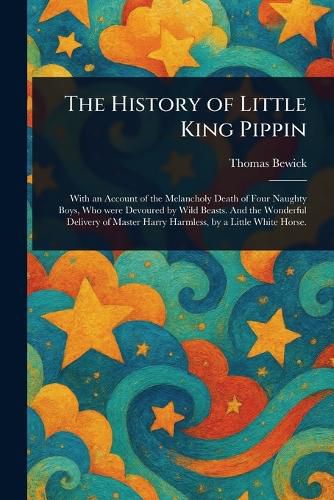Readings Newsletter
Become a Readings Member to make your shopping experience even easier.
Sign in or sign up for free!
You’re not far away from qualifying for FREE standard shipping within Australia
You’ve qualified for FREE standard shipping within Australia
The cart is loading…






This title is printed to order. This book may have been self-published. If so, we cannot guarantee the quality of the content. In the main most books will have gone through the editing process however some may not. We therefore suggest that you be aware of this before ordering this book. If in doubt check either the author or publisher’s details as we are unable to accept any returns unless they are faulty. Please contact us if you have any questions.
"The History of Little King Pippin," by Thomas Bewick, presents a collection of classic cautionary tales designed to instill valuable lessons in young readers. This timeless work of children's literature explores themes of morality and the importance of good conduct through engaging animal stories.
Included is the unforgettable account of four naughty boys whose unfortunate choices lead to a grim demise at the hands of wild beasts, serving as a stark warning against misbehavior. Conversely, the story highlights the virtues of obedience and kindness through the miraculous delivery of Master Harry Harmless by a little white horse.
This meticulously prepared edition preserves the charm and enduring appeal of Bewick's original work, offering readers a glimpse into the moral landscape of juvenile fiction. It remains a powerful and thought-provoking exploration of values and virtues, sure to captivate readers of all ages.
This work has been selected by scholars as being culturally important, and is part of the knowledge base of civilization as we know it.
This work is in the public domain in the United States of America, and possibly other nations. Within the United States, you may freely copy and distribute this work, as no entity (individual or corporate) has a copyright on the body of the work.
Scholars believe, and we concur, that this work is important enough to be preserved, reproduced, and made generally available to the public. We appreciate your support of the preservation process, and thank you for being an important part of keeping this knowledge alive and relevant.
$9.00 standard shipping within Australia
FREE standard shipping within Australia for orders over $100.00
Express & International shipping calculated at checkout
Stock availability can be subject to change without notice. We recommend calling the shop or contacting our online team to check availability of low stock items. Please see our Shopping Online page for more details.
This title is printed to order. This book may have been self-published. If so, we cannot guarantee the quality of the content. In the main most books will have gone through the editing process however some may not. We therefore suggest that you be aware of this before ordering this book. If in doubt check either the author or publisher’s details as we are unable to accept any returns unless they are faulty. Please contact us if you have any questions.
"The History of Little King Pippin," by Thomas Bewick, presents a collection of classic cautionary tales designed to instill valuable lessons in young readers. This timeless work of children's literature explores themes of morality and the importance of good conduct through engaging animal stories.
Included is the unforgettable account of four naughty boys whose unfortunate choices lead to a grim demise at the hands of wild beasts, serving as a stark warning against misbehavior. Conversely, the story highlights the virtues of obedience and kindness through the miraculous delivery of Master Harry Harmless by a little white horse.
This meticulously prepared edition preserves the charm and enduring appeal of Bewick's original work, offering readers a glimpse into the moral landscape of juvenile fiction. It remains a powerful and thought-provoking exploration of values and virtues, sure to captivate readers of all ages.
This work has been selected by scholars as being culturally important, and is part of the knowledge base of civilization as we know it.
This work is in the public domain in the United States of America, and possibly other nations. Within the United States, you may freely copy and distribute this work, as no entity (individual or corporate) has a copyright on the body of the work.
Scholars believe, and we concur, that this work is important enough to be preserved, reproduced, and made generally available to the public. We appreciate your support of the preservation process, and thank you for being an important part of keeping this knowledge alive and relevant.